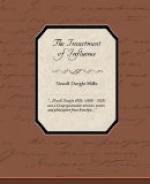The enemies of human life are not enemies that fill man’s streets with banners and charging cannon. We wage war against the dust mote ambushed in the sunbeam; we fight against weapons hurled from those battleships called drops of impure water; we wrestle with those hosts whose broadsides invisible rise from streets foul, or fall from poisoned clouds. Such enemies that lurk in dampness and darkness, a thousand fall at thy side and ten thousand at thy right hand. That great catastrophe that overtook Holland a century ago is not explained by a tidal wave that pierced through the dikes; the disaster was through the crawfishes that opened tiny holes and, weakening the bulwarks, let in the onrushing sea.
It was but a trifling error also that robbed the generations of one of man’s divinest pictures. Three hundred years ago the monks made tight and strong the roof above the room where was Da Vinci’s “Last Supper.” A thousand tiles were fastened down and all save one were perfect. The one hid a secret hole. When months had passed and the driving storm came from the right direction the rain found out that hidden fault and, rushing in, a flood of drops streamed down o’er the wall and made a great black mark across the noble painting, and ruined the central face forever.
Human life is ruined through the absence of humble virtues and the presence of little faults. There is no man so great, no gift so brilliant, but let it be whispered that there is falseness in the life of the hero, and immediately his greatness is dwarfed, his eloquence becomes a trick, his authority is impaired. Reading Robert Burns’ poems, he seems wiser than all the scholars, wittier than all the humorists, more courtly than princes. His genius blazes like a torch among the tapers. But watching this son of genius and of liberty weave a net for his own feet, and fashion a snare for his own faculties, with wistful hearts we long, as one has said, “to hear the exulting and triumphant cry of the strong man coming to himself, I will arise.” But he loved the barroom more than the library, and so fell on death at seven and thirty, and lost his right to rule as a king o’er men’s hearts and lives. Byron, too, and Goethe had gifts so resplendent that in kings’ palaces they shine like diamonds amid the pebbles. What a constellation of gifts was theirs! Culture, sanity, imagination, wit, courage, vigor—all these stars were grouped in their mental constellations! Yet little vices dethroned these kings and made them plebeian. It is the absence of little virtues and sweet domestic graces that seem trifling as the two mites that robs the Roman poets and orators of their power over us. They had urbanites indeed, flowers, music, art, oratory, letters, song. The events of each day were executed like a piece of music, and even their sarcophagi were covered with scenes of feasting and revelry. But they were not true; and that false note jars through all their pages. Harshness in the poet and pride in the orator make their refinement and culture seem but skin deep.




